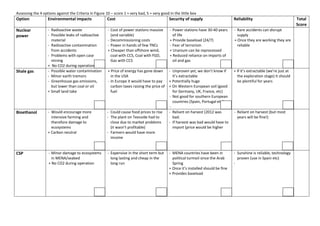Assessing the 4 options against the criteria in figure 10
- 1. Assessing the 4 options against the Criteria in Figure 10 ŌĆō score 1 = very bad, 5 = very good in the little box Option Environmental impacts Cost Security of supply Reliability Total Score Nuclear - Radioactive waste - Cost of power stations massive - Power stations have 30-40 years - Rare accidents can disrupt power - Possible leaks of radioactive (and variable) of life supply material - Decommissioning costs + Provide baseload (24/7) + Once they are working they are - Radioactive contamination - Power in hands of few TNCs - Fear of terrorism reliable from accidents + Cheaper than offshore wind, + Uranium can be reprocessed - Problems with open case coal with CCS, Coal with FGD, + Reduced reliance on imports of mining Gas with CCS oil and gas + No CO2 during operation Shale gas - Possible water contamination + Price of energy has gone down - Unproven yet, we donŌĆÖt know if + If itŌĆÖs extractable (weŌĆÖre just at - Minor earth tremors in the USA itŌĆÖs extractable the exploration stage) it should - Greenhouse gas emissions, - In Europe it would have to pay + Potentially huge be plentiful for years but lower than coal or oil carbon taxes raising the price of + On Western European soil (good + Small land take fuel for Germany, UK, France, etc) - Not good for southern European countries (Spain, Portugal etc) - Bioethanol - Would encourage more - Could cause food prices to rise - Reliant on harvest (2012 was - Reliant on harvest (but most intensive farming and - The plant on Teesside had to bad. years will be fine!) therefore damage to close due to market problems - If harvest was bad would have to ecosystems (it wasnŌĆÖt profitable) import (price would be higher + Carbon neutral - Farmers would have more income CSP - Minor damage to ecosystems - Expensive in the short term but - MENA countries have been in - Sunshine is reliable, technology in MENA/seabed long lasting and cheap in the political turmoil since the Arab proven (use in Spain etc) + No CO2 during operation long run Spring - + Once itŌĆÖs installed should be fine + Provides baseload

